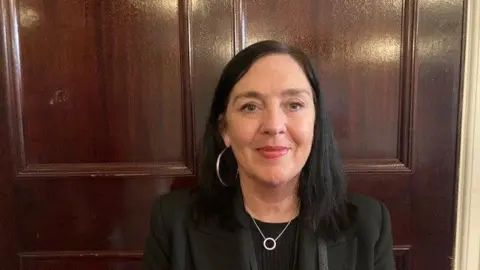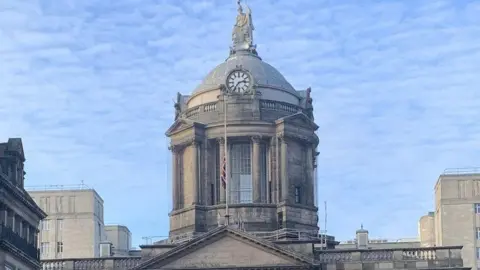Ketamine 'stealing futures of our city's children'
 PA Media
PA MediaKetamine is "stealing the futures" of a growing number of teenagers in Liverpool, a councillor has warned.
Councillors in the city agreed to draw up an action plan to raise better awareness of the extreme effects the drug can have.
A letter will also be sent from the council to the Secretary of State for Health calling for ketamine to be reclassified a Class A drug.
Labour councillor Lynnie Hinnigan, who proposed the motion calling for a ketamine action plan, told a full council meeting on Wednesday she had visited a specialist ketamine clinic in the city and heard first hand from a 20-year-old addict who had suffered incontinence as a result of using the drug.
She said the woman had "admitted to a room of strangers how she had to wear adult pull-ups, didn't want to die, and was going to leave the session and reuse as she couldn't cope with the pain."
Ketamine is an anaesthetic which is used in medicine as an anti-depressant and for pain relief.
It usually comes as a crystalline powder or liquid. It is also thought of as a party drug due to its hallucinogenic effects.
Ms Hinnigan told BBC Radio Merseyside that in her day job working with vulnerable young people, she was hearing about the drug "more and more".
"It terrifies me," she said.
"And you can see the impact on social media too, with teenagers sharing videos of people using the drug, they think it's funny but it's absolutely not."
In her speech she said videos of young people "k-holing" - a state of dissociation and paralysis - was something "that some now see as entertainment".
She added the effects of heavy use of the drug could include bladder and kidney problems, with some young people experiencing bladder failure and ultimately having to use a stoma bag.
 Claire Hamilton/BBC
Claire Hamilton/BBCShe said there needed to be an action plan with education campaigns and youth workers specifically targeting ketamine use. She also said dedicated clinics like the Lifeboat Project - a safe space for people recovering from addiction - should be replicated elsewhere in the city.
In England, the number of under-18s entering drug treatment who describe ketamine as one of their problem substances rose from 335 to 917 between 2020-21 and 2023-24, according to the National Drug Treatment Monitoring System.
An anonymised 2023 survey of more than 13,000 secondary schoolchildren from 185 schools across England reported 11% of 15-year-olds had been offered ketamine at some point. The same study, conducted for NHS England, suggested the use of ketamine among schoolchildren had more than doubled in the last decade from 0.4% in 2013 to 0.9% in 2023.
Professor of substance use at Liverpool John Moores University, Harry Sumnall, said one of the issues in Liverpool was a lack of local data about how widespread use was in the city.
"Drug services tell us that the number of people seeking treatment is increasing and hospitals particularly urologists are concerned around really heavy use and the impact on the bladder – these are relatively rare cases albeit increasing in number," he said.
The government said in January it had asked the Advisory Council on the Misuse of Drugs (ACMD) to commission advice on ketamine and to consider whether it should remain controlled as a Class B substance or become a Class A drug.
 Geograph/Richard Hoare
Geograph/Richard HoareListen to the best of BBC Radio Merseyside on Sounds and follow BBC Merseyside on Facebook, X, and Instagram and watch BBC North West Tonight on BBC iPlayer. You can also send story ideas via Whatsapp to 0808 100 2230.
